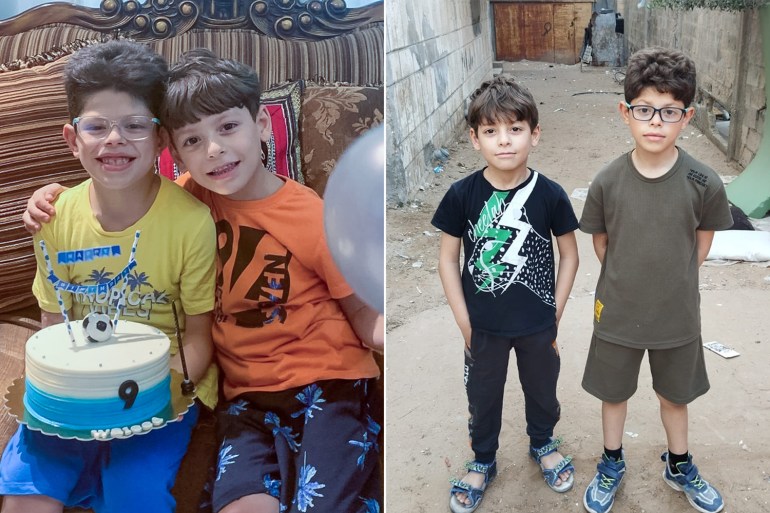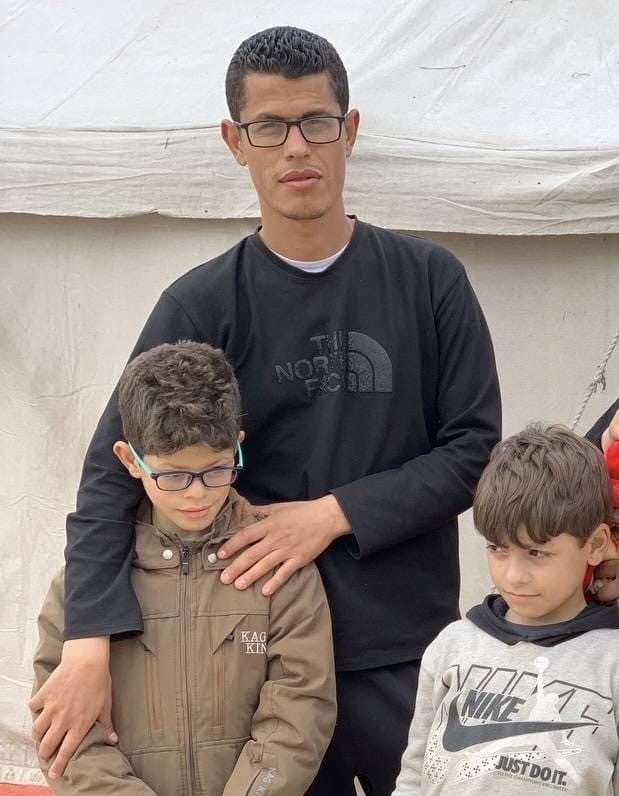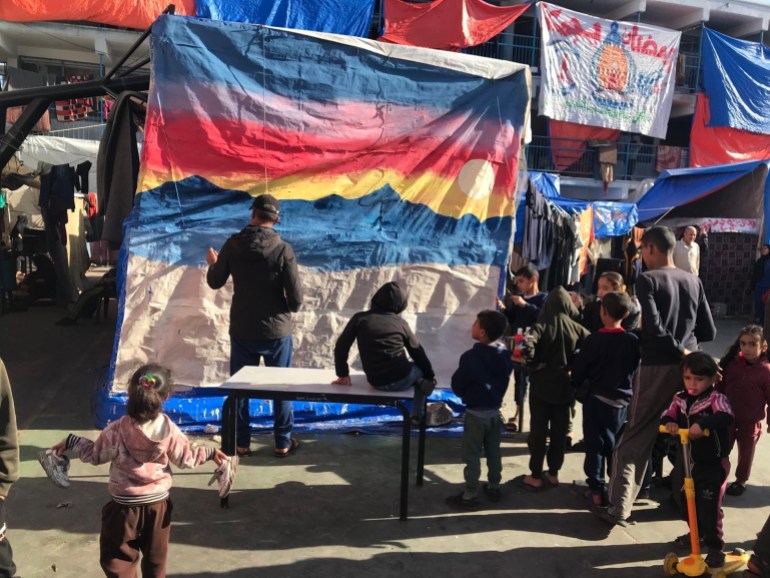Dreams deferred in Gaza as Israel invades Rafah
Gaza’s displaced grapple with having to leave Rafah and pushing the dreams they had before the war further out of reach.

Sarah Aljamal dreamed of doing voiceovers for the animated films Tangled or Ratatouille.
She had started taking voice acting classes with Fouad Shams, one of the best-known voice actors in the Middle East.
Keep reading
list of 4 itemsThe Take: With no universities left in Gaza, student protests bring hope
Pentagon chief confirms US pause on weapons shipment to Israel
Hospitals in south Gaza will run out of fuel in three days, WHO warns
Her dream, like many young women, was to be independent.
Despite being born with a hole in her heart and undergoing more than 20 surgeries in her short life for congenital defects in her bones and joints, the 23-year-old from Gaza City was determined.
Besides learning voice acting, Aljamal was doing translations and helping an international charity on disability issues.
But all that disappeared when her family’s home was bombed on day one of Israel’s war on Gaza.
Displaced from Gaza City to a single room on the ground floor of a building in Rafah for months, she and her family of eight – like many others in the eastern part of the city – received a foreboding phone call from the Israeli army on Monday morning: Go to al-Mawasi, the army said.
Aljamal, who can barely walk a few metres, has been in despair.
She had been trying to raise funds to pay to get her family out, in fear of a looming offensive in Rafah but Israel has since seized and closed the Rafah crossing into Egypt – cutting off the only exit from the strip and blocking Gaza’s main aid lifeline.
Now Aljamal fears what lies ahead for her and her family, as they plan their journey to al-Mawasi. They will have to walk, while she will be moved by wheelchair.
“How will I live in a tent with my parents under these health conditions? Will I be able to survive or will I die … because I cannot move?” she wondered.
From home by the sea to an uncertain future
For Khader al-Belbesy, 32, the evacuation order and the Israeli military’s gradual inroads into Rafah feel like the final nail in a coffin.
For the father of three, leaving the southern city with his young family is like taking them into an active battlefield.
On Monday, he had received an airdropped leaflet from the Israeli army instructing him and his family to leave eastern Rafah. He said the dropping of the leaflets felt as if the military had directly dropped saws on them.
“My mind is confused, and I’m looking for a place. There’s no transportation,” al-Belbesy told Al Jazeera.
Life in Gaza was not easy before the war, due to an ongoing Israeli blockade, but al-Belbesy had tried to build a comfortable life for his family – he worked hard as an electrician and his wife Tasneem, 31, was a talented pharmacist.
They lived in a large house near the sea in Tal al-Hawa and their eldest son Walid, 9, played in a football club in hopes of becoming a professional footballer one day.
That club no longer exists, with many of its young players killed in the war. And the family has lost their jobs, their house, their car and all their possessions.

“I never expected this to happen to me and my family,” said al-Belbesy. “The war destroyed everything.”
A little more than a month ago, Tasneem gave birth to their third child in the one-room apartment they had been sheltering in for months – with no medical care.
There was no transportation available to get to the nearest hospital, which al-Belbesy said might have been futile anyway, as the war has rendered all of Gaza’s hospitals dysfunctional.
He had also been fundraising to evacuate his family to Egypt to get away, and now, even if there was a permanent ceasefire tomorrow, he would leave Gaza, he said.
“I [will] search for a country to go to with my children to ensure a future for them … Because the Gaza Strip [requires] 20 years for rehabilitation,” al-Belbesy said.

‘Necessity is the mother of invention’
Mohammed Almadhoun has been trying to get out of Gaza for months – but the exorbitant prices border agents are reportedly charging have kept him from making the journey.
The 44-year-old visual artist from Gaza’s Jabalia was set to fly to Ireland for an art residency, his flight scheduled for October 7, the same day Hamas launched its surprise incursion on Israel.
Now, he leads mural painting workshops for the children in the school he is sheltering in, using whatever scraps of material and paint he can find.

He now lives in the corner of a classroom, packed in like sardines with other Palestinians.
The living conditions there have led to health issues, including a lung infection he developed a few months ago because of the cold, he said.
“The windows are open and cannot be closed because of the bombing. They break and it will be dangerous for us,” he told Al Jazeera.
The sound of Israeli air strikes has been near-constant for the last seven months, and when Israel launched an overnight assault on eastern Rafah earlier this week, “the sound of bombing did not stop” all night, he said.
“Our life is a hell without mercy for humanity. I write to you while crying,” he said through mobile phone messages.
But even in his anguish, the artist has found avenues for creativity.
In addition to teaching art classes to children, he has rigged a temporary stove, using a large can of burning wood pulp soaked in canned fish oil.
“Necessity is the mother of invention,” he said.
One vehicle, several families, mattresses piled high
For weeks now, Louise Wateridge has been witnessing the uncertainty that Aljamal, al-Belbesy and Almadhoun are feeling, along with the thousands of Palestinians there.
“People here really cannot plan in any way as far as even a week, let alone a couple of days,” the United Nations agency for Palestinian refugees (UNWRA) spokesperson told Al Jazeera.
“It’s just the way that life has been for the last few months,” Wateridge said from western Rafah.
Now, that uncertainty has intensified.
“This horrible image of what we’ve seen throughout the war, of these displaced families with all of their belongings in one vehicle, mattresses piled up, everything … We’re seeing a lot of that.”
But this exodus towards western Rafah is slow, she said, as many cannot leave for financial or physical reasons.
Those staying are choosing to use whatever little cash they have left for food, water and other survival essentials, she added.
Aljamal’s family is one of many to have run out of money, but who are still trying to make the trek westward.
Her father had, before the war, been saving up for her to receive treatment in Egypt. But they have since used all that money and then some to rent the small room they had been staying in, in eastern Rafah.
The family is still searching for a tent they can stay in, in al-Mawasi.
“I dreamed of living a beautiful life … but the war destroyed our dreams, our homes and our lives,” said Aljamal.
“Will I prove myself and achieve all my ambitions one day?”